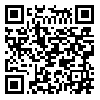Volume 64, Issue 9 (1 2006)
Tehran Univ Med J 2006, 64(9): 46-54 |
Back to browse issues page
Download citation:
BibTeX | RIS | EndNote | Medlars | ProCite | Reference Manager | RefWorks
Send citation to:



BibTeX | RIS | EndNote | Medlars | ProCite | Reference Manager | RefWorks
Send citation to:
Modarres M, Mir Mohammad Ali M, Haghani H, Arami R, Rahnama P. The conformity of BPP and vibroacoustic stimulation results in fetal non reactive non stress test. Tehran Univ Med J 2006; 64 (9) :46-54
URL: http://tumj.tums.ac.ir/article-1-900-en.html
URL: http://tumj.tums.ac.ir/article-1-900-en.html
Abstract: (7349 Views)
Background: The most frequently used test for evaluation of fetal health is the Non Stress Test (NST). Unfortunately it has a high incidence of false positive results. The combination of vibroacoustic stimulation with the NTS has been shown to reduce non reactive results.
Methods: A tests assessment method was chosen with a simple randomized sampling. 40 pregnant women with non reactive NST in the first 20 minutes who received VAS in one of Tehran University's Hospitals were compared with BPP scores. A vibroacoustic stimulation was applied for a 3 seconds on the maternal abdomen and fallowed within 10 minutes.Data collection tools were NST, sonography instruments ,NST result paper, tooth brusher, watch, demographic questioner and check list. Data analysis was made by descriptive static and by using the Fisher's Exact Test (with level of significant at p<0/05). All statistical analysis were performed using an spss/win.
Results: After VAS, 70% of non reactive tracing became reactive. All cases with fetal reactivity response after a VAS had a subsequent BPP score of 8 (negative predictive value of 100%). False positivity of VAS was lower than NST.
Conclusion: VAS offers benefits, by decreasing the incidence of non reactive test and reducing test time. VAS lowers the rate of false positive NST. VAS is safe and allows more efficient of prenatal services. This test could be used as a rapid antepartum test to predict fetal well-being.
Methods: A tests assessment method was chosen with a simple randomized sampling. 40 pregnant women with non reactive NST in the first 20 minutes who received VAS in one of Tehran University's Hospitals were compared with BPP scores. A vibroacoustic stimulation was applied for a 3 seconds on the maternal abdomen and fallowed within 10 minutes.Data collection tools were NST, sonography instruments ,NST result paper, tooth brusher, watch, demographic questioner and check list. Data analysis was made by descriptive static and by using the Fisher's Exact Test (with level of significant at p<0/05). All statistical analysis were performed using an spss/win.
Results: After VAS, 70% of non reactive tracing became reactive. All cases with fetal reactivity response after a VAS had a subsequent BPP score of 8 (negative predictive value of 100%). False positivity of VAS was lower than NST.
Conclusion: VAS offers benefits, by decreasing the incidence of non reactive test and reducing test time. VAS lowers the rate of false positive NST. VAS is safe and allows more efficient of prenatal services. This test could be used as a rapid antepartum test to predict fetal well-being.
| Rights and permissions | |
 |
This work is licensed under a Creative Commons Attribution-NonCommercial 4.0 International License. |





